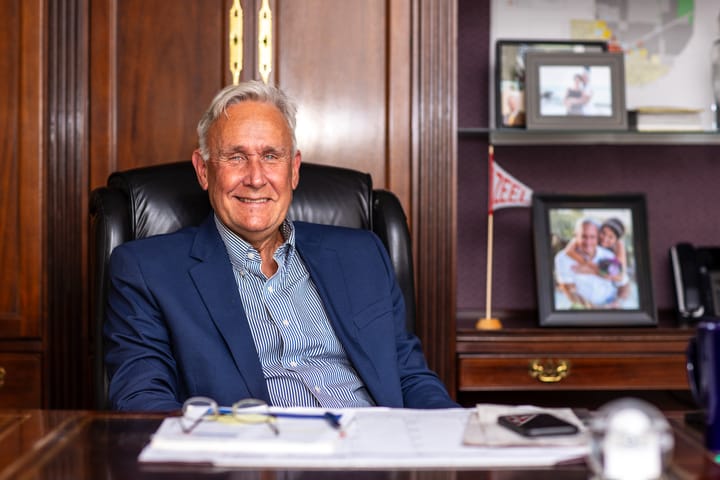County poised to urge delay in closing Campbell as officials say plan likely won't change
Although Ottawa County is not interested in getting into the public utility business, concerns continue to mount about the stability of the energy grid.
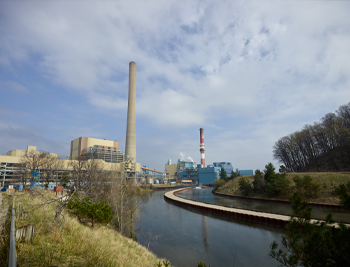
Story summary
- The Ottawa County Board of Commissioners is set to approve a resolution on Tuesday urging Consumers Energy to delay the closure of the J.H. Campbell plant, which is slated for the end of May 2025.
- Consumers Energy said the plan for closure has been vetted and approved from multiple stakeholders and regulatory agencies and, unless critical grid stability concerns are established prior to closure, the plan is likely to remain in place.
- Port Sheldon Township says it’s already planning for a future beyond a coal-burning plant and feels that it has a good economic outlook, in terms of tax base.
OTTAWA COUNTY — Although Ottawa County is not interested in getting into the public utility business, concerns continue to mount about the stability of the energy grid.
An initiative called "Save the Campbell" coalesced at the beginning of 2024 that aimed to prevent Consumers Energy from decommissioning and demolishing the coal-fired J.H. Campbell Plant in Port Sheldon Township.
Organizers of the effort — members of far-right fundamentalist groups Ottawa Impact and The Gideon 300 — said a government-owned electric co-op was possible if voters approved a "home rule charter" at the ballot box.
The issue was never put up for a vote, so a change in government structure is not forthcoming; however, local officials are asking Consumers Energy for reassurance that local energy supplies will be uninterrupted as the Campbell plant is headed for closure at the end of May.
Read More: 'Save the Campbell' is about far more than utilities — here's why
Now the Ottawa County board of Commissioners is poised on Tuesday, Feb. 25, to join a handful of local municipalities to urge Consumers to delay the closure.
Consumers’ leadership, however, said the closure will not be delayed “unless there's reliability concern.”
“We take our responsibility for reliability seriously. And so when we hear concerns and the like, we want to address them. We want to explain them, and where there are concerns that are legitimate, we try to address them,” said Srikanth “Sri” Maddipati, vice president of electric supply with Consumers.
“We care. I don't want the power going out any more than you do. So we're all in this together.”
How we got here
The Campbell Plant is Consumers' last — and largest — coal-fired plant in the state.
The plant, operating since 1962, was originally scheduled to close partially in 2030 and wholly in 2040. But the utility announced in 2021 it was moving the plan up by 15 years for an operations end date of May 31, 2025.
Read More: Consumers Energy reaches agreement to close Campbell plant, end utility's coal use by 2025
The utility seeks to end coal use altogether by 2025 as part of its goal to achieve carbon neutrality.
Since the announcement, Consumers has been actively preparing the plant for "full retirement," a spokesperson said last year.
"The complex will officially go into retirement with an aim to go cold and dark after 2025," said former Consumers spokesperson Kristen Van Kley. "In 2026 and on, the complex will be demolished with a plan to restore the site over time."
The plant, when operating at full capacity, can generate 1,450 megawatts of electricity. Michigan consumed about 113,740 gigawatt hours of electricity in 2019, according to a 2020 report from the U.S. Department of Energy.

Van Kley said new technologies will ensure Consumers continues to support the statewide grid.
"Energy efficiency, demand response and emerging technologies such as grid modernization and battery storage will help us lower peak customer demand for electricity and deliver exactly what Michigan needs," she said. "Our plan is designed to respond to emerging needs, adapt to changing conditions and embrace emerging innovative technologies as we work to achieve net zero carbon emissions."
Key to that strategy are natural gas-fired plants in Consumers' portfolio, Van Kley said, which include locations in Zeeland, Jackson and a 1,200-megawatt facility that began operating in Van Buren County's Covert Township in June 2023.
Those operations "will supply reliable, on-demand electricity to meet Michigan’s energy needs when renewables and other sources are not available," Van Kley said.
Meanwhile, efforts continue to restart operations at Palisades Nuclear Power Plant in Covert Township. The facility, owned by New Jersey-based Holtec International, went offline for decommissioning in May 2022.
Holtec hopes to resume operations at Palisades by the fourth quarter of 2025, but the plant still needs to secure licensing from the NRC. The company also plans to file a construction permit application in 2026 for a pair of small modular reactors, significantly increasing on-site production, The Holland Sentinel reported Feb. 19.
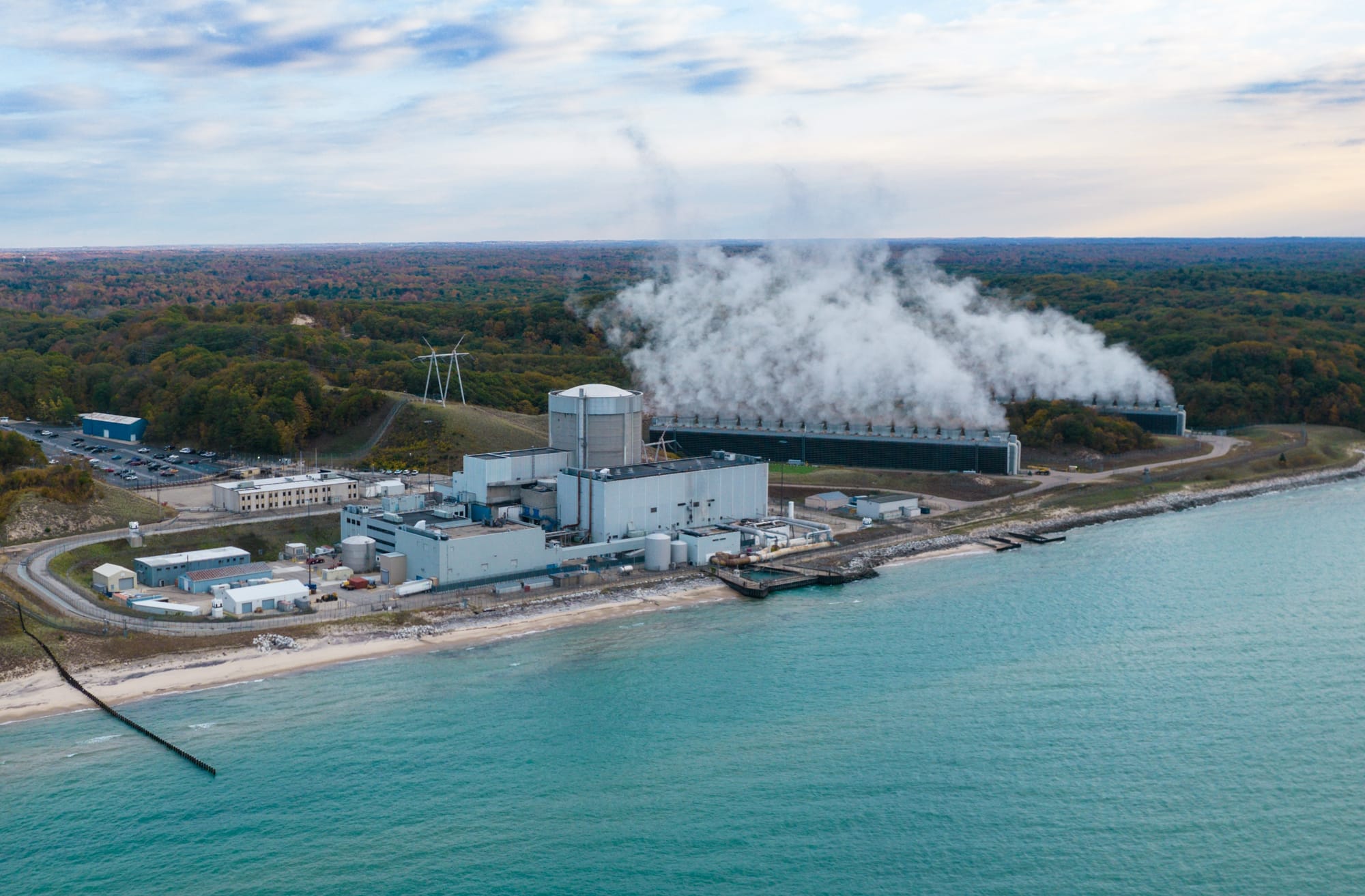
However, concerns over restarting the 53-year-old nuclear plant have led to challenges from residents and environmental groups. A recent panel of three administrative judges on the Nuclear Regulatory Commission’s Atomic Safety and Licensing Board heard oral pre-arguments on petitions filed that challenge plans to restart Palisades, The Sentinel reported.
A successful restart would pave the way for the plant to add 800 megawatts of baseload generation back to the state's power grid.
‘Save the Campbell’ messaging evolves
'Save the Campbell' is championed by Jenison resident Joe McCarter, who has appeared before various units of government in Ottawa County over the past year urging them to oppose green energy policies championed by Democrats like Gov. Gretchen Whitmer.
Those policies are "part of the long-term agenda of off-lining reliable sources like coal and hydroelectric" for unreliable ones like solar, wind and battery storage, according to McCarter.
In November 2023, Whitmer signed legislation that:
- Creates new clean and renewable energy generation requirements
- An office designed to assist workers with the transition to clean energy
- Perhaps most contentiously: The authority for state regulators to override local authorities that deny applications for clean energy facilities like solar farms and wind turbines
In November, more than 70 townships and several counties appealed to the Michigan Court of Appeals, contending the state’s interpretation of the law “attempts to vastly expand” state jurisdiction over renewable energy permitting, according to Bridge Michigan.
McCarter, a CFO and controller at a local packaging equipment manufacturer, gained some traction with the Ottawa Impact majority that controlled the board of commissioners in 2023 and 2024.
He applied for the open District 6 board seat after former commissioner Kyle Terpstra resigned unexpectedly in November 2023.
During his public interview with the board of commissioners, McCarter, a Texas native, said he admires the current Ottawa Impact majority.

“You all inspired me," he said. "As I saw what you all were doing, in terms of government … when I saw that you really meant it in terms of seeking to preserve our liberties and our Christian principles, it inspired me to get involved.”
McCarter wasn't selected for the role, but two of the other three finalists — Joel Buck and Lynn Jansen — subsequently joined him in the Save the Campbell campaign as well as former OI commissioner Gretchen Cosby.
McCarter urged the county board throughout 2024 to consider putting a ballot measure up for a vote to convert the county from a general law style of government — where its board of commissioners shares executive and legislative functions with other county-wide elected and appointed officials — to creating a “home rule” charter, which would convert the administrator position from an employee to a countywide elected position.
Through the charter, the county would be able to dictate the powers and duties of the administrator, such as whether they have veto power, how staff functions are handled, and which departments they control. Alternatively, the charter could leave such matters for the county board and administrator to sort out.
Although the issue never materialized at the ballot box, McCarter has since evolved his message to now focus on recruiting local municipalities to encourage Consumers Energy to delay the closure of the Campbell plant.
He appeared before the board’s Finance and Administration subcommittee on Feb. 11 and urged commissioners to follow a handful of townships within Ottawa County that have passed resolutions requesting that Consumers delay the Campbell closure.
To date, the following townships have approved resolutions:
- Blendon
- Chester
- Georgetown
- Grand Haven
- Jamestown
- Polkton
- Zeeland
McCarter said current state law “recognizes the need to delay closures if the grid is endangered.”
Board hears from Consumers Energy
McCarter’s most recent appearance before the board coincided with a planned presentation by Consumers Energy representatives for commissioners and the public to get an update on the planned Campbell closure.
Dena Isabell, stakeholder engagement manager at Consumers, outlined assets within the company’s portfolio, including the Zeeland and Covert generating stations. She said those added 1,200 megawatts to help offset the planned closure of Campbell later this year.
The decommissioning process for the plant is expected to take about five years to complete, she said.
“The construction timeline is about five years from start to finish. That includes all of our remediation and restoration. We're going to go four feet below grade, and then full restoration so that it can be reused and repurposed. So that's really going to be that focus,” she said.
Isabell explained how the energy grid is monitored in Michigan through MISO, or the Midcontinent Independent System Operator, which is a regional transmission organization that manages the electric grid in the Midwest and South for a total of 15 states.
She outlined how Consumers fits within that system.
“We're part of that system. We manage the Lower Peninsula of Michigan, so what we generate in Michigan stays with our customers in the Lower Peninsula of Michigan,” Isabell said.
She said the company works with MISO when it considers adding or eliminating energy assets.
“We have to do interconnection agreements,” Isabell said. “What that means is when we decide to add anything into the system or take anything off the system, we have to work with MISO to get an acceptable agreement to do that. So, in 2022, when we decided to retire the Campbell plant, we had to get an approval from MISO to do that. And we did get that approval to suspend those operations in 2022 with no comments or concerns about the capacity to do that. I think that's very important to note that.”
Commissioners pointed to two separate reports — from MISO as well as the North American Electric Reliability Corporation, or NERC — that gave them concerns over the energy grid’s reliability once the Campbell is taken offline.
MISO published the results of its annual survey in June 2024, which indicated at the time that there was “a growing capacity deficit beginning in the 2025-26 planning year.”

“Next summer, MISO could see resource sufficiency ranging from a 2.7 GW capacity shortfall to a 1.1 GW surplus, underscoring the need to accelerate resource additions, monitor large load additions, and delay resource retirements to reliably manage the anticipated growth in electricity demand,” according to the survey.
NERC is a nonprofit international regulatory authority that more broadly looks at reliability standards as well as seasonal and long‐term outlooks for the entire U.S. grid. The group published a long-term reliability assessment in December 2024 that labeled MISO’s section of the grid as “high risk,” meaning the grid subsection that includes the state of Michigan “falls below established resource adequacy criteria in the next five years.”
“High-risk areas are likely to experience a shortfall in electricity supplies at the peak of an average summer or winter season. Extreme weather, producing wide-area heat waves or deep-freeze events, poses an even greater threat to reliability,” the report said.
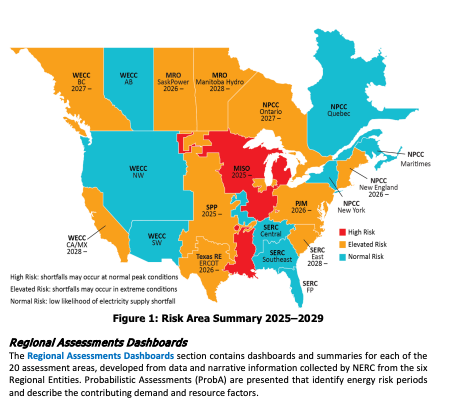
Commissioner Jacob Bonnema questioned why Consumers opted to sunset the plant five years ahead than previously planned.
Isabell pointed to a clean energy plan that Consumers adopted in 2021 that helped the company identify about $600 million in savings for its customers over 20 years with the retirement of the plant.
“That includes renewables that get brought onto the grid, which are cheaper than what we have,” she said, “so that is a savings to our customers, which is part of the clean and affordable and reliable energy — so it's an economic decision.”
One component of the cost savings was coal.
Rich Houtteman, community affairs manager for Consumers, explained that the cost of shipping coal is a huge financial consideration for the energy company.
“It's about $50 a ton to ship excess coal off-site,” he said. “We had 30,000 tons. That's a lot for our customers. So we're trying to burn up all the coal as we kind of bring in 130 train car loads a day.”
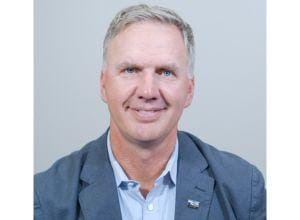
OI Commissioner Allison Miedema asked what Consumers was building to replace Campbell.
Isabell pointed to renewables as well as natural gas assets.
“We do have a lot of renewables that are coming online, so that is very important to us,” she said. “We do have natural gas. We like natural gas. It is part of our future that we have — it is agile, it's able to come online quickly, we can dispatch that in a matter of hours, versus a matter of days in the cold — so we see natural gas as part of our future.”
Isabell also noted wind and solar and battery storage, “which is going to be a major, major component and required by law, so we are going to be adding a ton of battery storage as well.”
After Isabell noted that the state’s new clean energy laws required energy companies to have clean and sustainable energy sources by 2040, OI Commissioner Sylvia Rhodea asked if the new Trump Administration’s policies could lead to a relaxation in Consumers’ plans.
“Is it possible we might see a change in that legislation that would lift those requirements? I'm just wondering if it could be slowed down if we're not looking at deadlines until 2040,” Rhodea said.
Isabell said Consumers was committed to its clean energy plan in 2021 — before the legislation in Michigan was approved in 2023 — and that bringing massive assets like the Campbell on and off the grid is no simple or quick task.
“We do our best to try to be as agile as possible, but assets like this aren't something that you can just bring on and take off very quickly,” she said. “So we do our best in these integrated resources plans to try to plan for what we think could be possible in the future. But we can't plan for everything that could happen with any type of policy. So our plan to retire (Campbell) was on the last integrated resource plan, which does actually meet the new state policy, which works for us going forward.
“But large assets like that aren't something that you can just quickly change with new policies in two years.”
The integrated resource plans are required by the Michigan Public Service Commission, a regulatory agency that oversees public utilities in Michigan.
“The Michigan Public Service Commission requires us to create a 20-year plan that says, ‘How are you going to serve your customer, clean, reliable and affordable energy for the next 20 years?’ And this requires us to come up with scenarios.”
Those scenarios are then presented to stakeholders in a series of workshops over two years with community stakeholders who then provide feedback to help.
“We're retooling, and we're getting ready to do our next integrated resource plan, new technologies, new laws, new things like that require us to be agile. We constantly need to update those plans and make sure that we're giving our customers the best technology and the best cost we possibly can,” Isabell said.
Despite the explanation and justifications, some commissioners pointed to the MISO and NERC reports, asking for the Consumers representatives to address energy grid security.
“There's an elephant in the room, and I just want to make sure that we're fully addressing this,” said Commissioner Jim Barry. “I still don't feel like I really have a complete thought process on how MISO works with the grid and Consumers works with MISO and the grid, but … they've voiced some concern about a hasty transition closing the coal coal plants … that renewables are the future, but that we're not there yet. How would you respond to that?”

Isabell said Consumers produces energy in Michigan and serves Michigan energy customers first.
“MISO manages 15 states, from Michigan down to Louisiana, so Michigan is a component of that grid. But we're one state of 15, so I can speak to what we can control within Michigan, and we provide power to the Lower Peninsula of Michigan, and I provide an integrated resource plan for the customers in Michigan,” Isabell said. “I can't speak beyond what MISO talks about and their resource adequacy beyond what I can do in Michigan.”
Consumers' leadership weighs in
Srikanth “Sri” Maddipati is the vice president of electric supply with Consumers Energy.
He said he understands that residents and stakeholders have concerns about the future of the energy grid, but that Consumers will continue to provide reliable service.
“I think the message I would say is that we're prepared for this,” Maddipati said. “And there are resources coming online or that we've already had come online to support this. Concerns about reliability we take seriously, and we're working with all the different kinds of overlapping stakeholders and regulators teams to address them.”

“Consumers is going to provide reliable and affordable energy as we're transitioning away from coal. We haven't done all of this all at once. This has happened over a course of a decade, and we will continue to develop new assets to deliver clean energy that's affordable,” he said.
Maddipati said these sorts of decisions are not taken lightly and are the result of constant planning over many years.
“When we make decisions about future electric supply and power plants, we do that holistically,” he said. “So one of the things that maybe gets lost is we bought a gas plant up the road a little bit in Covert — about 1,200 megawatts — and brought that into our grid. And so, when you think about MISO stability, we made that change purposely.”
He said the company has procured incremental battery capacity as well, with the first one coming online mid-2025, and that another 400 megawatts of batteries will come online over the next three years.
“There are replacements that we have implemented in terms of replacing the energy, and what we were getting from Campbell with newer technologies and units and different technologies that are perfectly more flexible and annual,” he said.
Maddipati said sometimes it’s difficult to understand that a power-generating facility doesn’t have to necessarily be local; rather, he encouraged residents to think about it in an overall grid structure.
“It is not a question around grid reliability as a whole,” he said. “I think that's the conversation here. I think people maybe mis-think that because that plant is located near them, that's what serves their electricity. Yes, some assets need to be local, but we plan for that, and that locality question is more in Michigan versus a right-next-to-my-house kind of thing.”
Maddipati addressed concerns posed by OI commissioners during the Feb. 11 meeting that Consumers’ plan to incorporate solar farms into its portfolio could lead to the loss of farmland.
He encouraged municipalities and residents to support energy evolution.
“How we generated electricity 200 years ago is different than we do today. We use different technology,” he said. “We have different sources, we have different ways of doing it, and we are constantly leveraging new technology. Saying yes to that, so that we can actually get more energy resources online is what's going to help us, because a lot of this is related to growth.”
Maddipati said if municipalities want to grow their industrial and commercial tax base, it will take energy.
“So we have to keep building new energy assets to support that,” he said. “And if we can have folks supporting new energy assets, then we're gonna be able to track those new jobs and that new business.”
He said the key is to work with landowners and units of government to find a path forward.
“We work with local communities. We are building solar in different parts of the state, and we work with those local communities to work with landowners who do want to sell their land,” he said. “Maybe it wasn't something that they were using to farm in some instances; we're creating scenarios where you can still farm it. We're looking at some of that that will evolve over time. … I think the question becomes, for that landowner, what control do they get over their own property? In terms of being able to say what's the best use of that?”
He also reminded local residents that Consumers’ plan has been vetted and approved by multiple oversight agencies.
“I just want to be clear that we go through various processes with various stakeholder reviews and the plan that we had here was signed off from the Public Service Commission staff, the attorney general, business groups related to this, as well as environmental groups. We took a lot of stakeholder input. That's what that process is set up for,” he said.
Port Sheldon Township is moving forward
Houtteman, the Consumers community affairs manager, said it will take 20 years to remove the coal fly ash — a fine, powdery material that is a byproduct of coal burning — will take about 20 years to fully remediate from the Campbell site, which spans 2,000 acres.
“As far as our ash goes, we're going to be partnering up with a company called Ashcor to remove about 6 million tons of coal ash from our landfills over the next 20 years that shall be repurposed as a cement-replacement material that can substitute about 30 percent of cement and concrete, which is great for sustainable building products and construction,” Houtteman said.
Isabell, the stakeholder engagement manager, said Consumers continues to work with Port Sheldon Township on the future purpose of the site.
“Economic resiliency is understanding the loss of tax base,” she said. “What happens when a large facility like Consumers Energy closes down, and how do you kind of restore that tax base? And what does that look like in the future? How do you continue to be resilient in the future of a small township like that going forward?”
The township has said it’s already moving forward toward a future without the Campbell.
“We have been told explicitly that that is not an option because Consumers is bound by the MPSC and their integrated resource plan,” said Mike Sabatino, Port Sheldon Township supervisor.
Sabatino said his township — which notably has not passed a resolution urging a delay in closure — understands the fear of change, but that local officials understand the decision making and how Consumers and residents will move forward.
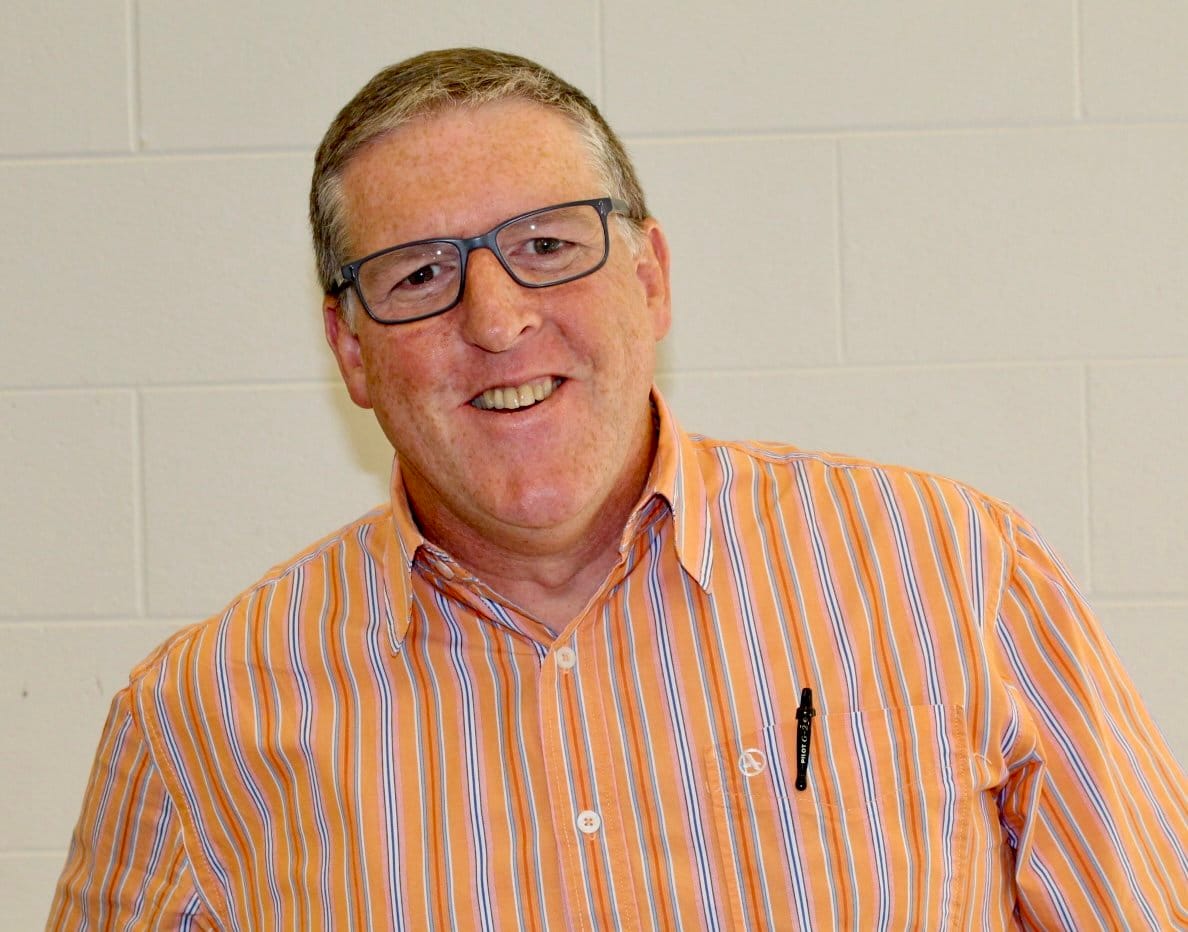
“I understand the sentiment — this is something that's been here for 60 years — but it's been explained to us,” he said. “This is a $600 million decision for their shareholders. Plants are very expensive.”
Sabatino pointed out that even with the local units of government urging a delay, ultimately the facility and the land is owned by Consumers.
“There's nothing that we can do to prohibit them from closing; there's no ordinance that we can pass or anything like that,” he said. “They've already agreed to this closure timeline.”
Support Our Work
Ottawa News Network is a nonprofit news service dedicated to providing the residents of Ottawa County with trustworthy, community-driven news. ONN treats journalism as a public good — something that enriches lives and empowers Ottawa County’s 300,000-plus residents to stay engaged, make informed decisions, and strengthen local democracy. Please consider giving today.
Sabatino said the township recently completed a five-year master plan, which found that “the implications for tax revenue turned out not to be that bad at all.”
“We're in very good shape with that,” he said.
Sabatino pointed to the township’s master plan as a way to incorporate preferences of residents on future purposes of the site.
“(Consumers) have not indicated they're disposing of any of that property, but they have committed to work cooperatively with the community and take that input into account as they make those decisions,” he said.
Isabell said Consumers will continue to be a community partner with the township.
“This whole master plan, this whole process, has been done in partnership with the township. Obviously, Consumers Energy is supporting them 100% through this entire process,” she said. “We're kind of opening up the floor for the community to come in and have a conversation with us about the 2,000 acres. What would you guys like to see in future use? I think that's important, because they were there before us, right?
— Sarah Leach is the executive editor of the Ottawa News Network. Contact her at sleach@ottawanewsnetwork.org. Follow her on Twitter @ONNLeach.



